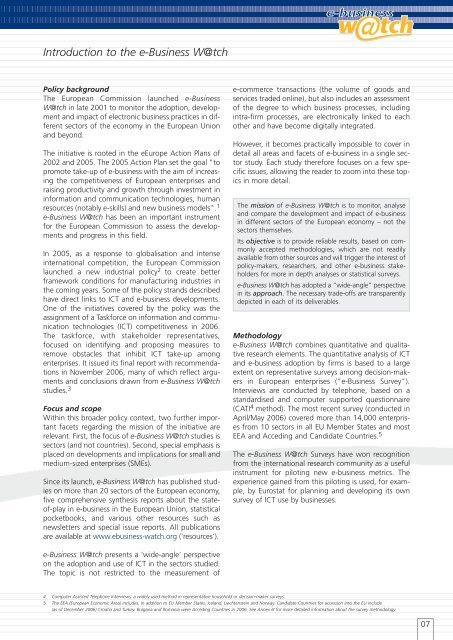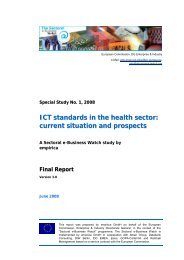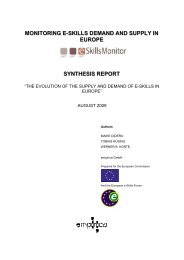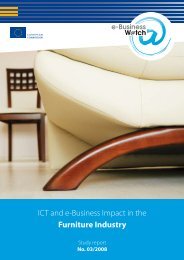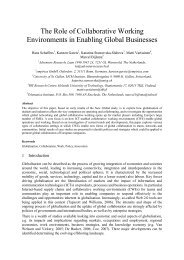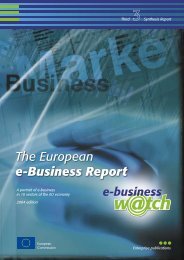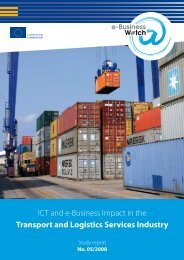The European e-Business Report The European e ... - empirica
The European e-Business Report The European e ... - empirica
The European e-Business Report The European e ... - empirica
- No tags were found...
Create successful ePaper yourself
Turn your PDF publications into a flip-book with our unique Google optimized e-Paper software.
Introduction to the e-<strong>Business</strong> W@tchPolicy background<strong>The</strong> <strong>European</strong> Commission launched e-<strong>Business</strong>W@tch in late 2001 to monitor the adoption, developmentand impact of electronic business practices in differentsectors of the economy in the <strong>European</strong> Unionand beyond.<strong>The</strong> initiative is rooted in the eEurope Action Plans of2002 and 2005. <strong>The</strong> 2005 Action Plan set the goal "topromote take-up of e-business with the aim of increasingthe competitiveness of <strong>European</strong> enterprises andraising productivity and growth through investment ininformation and communication technologies, humanresources (notably e-skills) and new business models". 1e-<strong>Business</strong> W@tch has been an important instrumentfor the <strong>European</strong> Commission to assess the developmentsand progress in this field.In 2005, as a response to globalisation and intenseinternational competition, the <strong>European</strong> Commissionlaunched a new industrial policy 2 to create betterframework conditions for manufacturing industries inthe coming years. Some of the policy strands describedhave direct links to ICT and e-business developments.One of the initiatives covered by the policy was theassignment of a Taskforce on information and communicationtechnologies (ICT) competitiveness in 2006.<strong>The</strong> taskforce, with stakeholder representatives,focused on identifying and proposing measures toremove obstacles that inhibit ICT take-up amongenterprises. It issued its final report with recommendationsin November 2006, many of which reflect argumentsand conclusions drawn from e-<strong>Business</strong> W@tchstudies. 3Focus and scopeWithin this broader policy context, two further importantfacets regarding the mission of the initiative arerelevant. First, the focus of e-<strong>Business</strong> W@tch studies issectors (and not countries). Second, special emphasis isplaced on developments and implications for small andmedium-sized enterprises (SMEs).Since its launch, e-<strong>Business</strong> W@tch has published studieson more than 20 sectors of the <strong>European</strong> economy,five comprehensive synthesis reports about the stateof-playin e-business in the <strong>European</strong> Union, statisticalpocketbooks, and various other resources such asnewsletters and special issue reports. All publicationsare available at www.ebusiness-watch.org ('resources').e-commerce transactions (the volume of goods andservices traded online), but also includes an assessmentof the degree to which business processes, includingintra-firm processes, are electronically linked to eachother and have become digitally integrated.However, it becomes practically impossible to cover indetail all areas and facets of e-business in a single sectorstudy. Each study therefore focuses on a few specificissues, allowing the reader to zoom into these topicsin more detail.<strong>The</strong> mission of e-<strong>Business</strong> W@tch is to monitor, analyseand compare the development and impact of e-businessin different sectors of the <strong>European</strong> economy – not thesectors themselves.Its objective is to provide reliable results, based on commonlyaccepted methodologies, which are not readilyavailable from other sources and will trigger the interest ofpolicy-makers, researchers, and other e-business stakeholdersfor more in depth analyses or statistical surveys.e-<strong>Business</strong> W@tch has adopted a “wide-angle” perspectivein its approach. <strong>The</strong> necessary trade-offs are transparentlydepicted in each of its deliverables.Methodologye-<strong>Business</strong> W@tch combines quantitative and qualitativeresearch elements. <strong>The</strong> quantitative analysis of ICTand e-business adoption by firms is based to a largeextent on representative surveys among decision-makersin <strong>European</strong> enterprises ("e-<strong>Business</strong> Survey").Interviews are conducted by telephone, based on astandardised and computer supported questionnaire(CATI 4 method). <strong>The</strong> most recent survey (conducted inApril/May 2006) covered more than 14,000 enterprisesfrom 10 sectors in all EU Member States and mostEEA and Acceding and Candidate Countries. 5<strong>The</strong> e-<strong>Business</strong> W@tch Surveys have won recognitionfrom the international research community as a usefulinstrument for piloting new e-business metrics. <strong>The</strong>experience gained from this piloting is used, for example,by Eurostat for planning and developing its ownsurvey of ICT use by businesses.e-<strong>Business</strong> W@tch presents a 'wide-angle' perspectiveon the adoption and use of ICT in the sectors studied.<strong>The</strong> topic is not restricted to the measurement of4. Computer Assisted Telephone Interviews, a widely used method in representative household or decision-maker surveys.5. <strong>The</strong> EEA (<strong>European</strong> Economic Area) includes, in addition to EU Member States, Iceland, Liechtenstein and Norway. Candidate Countries for accession into the EU include(as of December 2006) Croatia and Turkey. Bulgaria and Romania were Acceding Countries in 2006. See Annex III for more detailed information about the survey methodology.07


